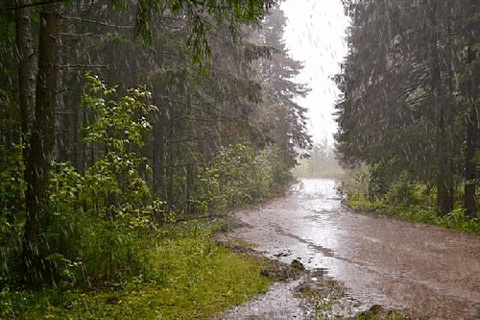
Most people notice a distinctive smell in the air after it rains. It’s frequently linked with spring, as the smell of fresh cut grass is associated with summer. You’ll find it in a lot of poetry and also on many inspirational lists of things to be happy about. But what causes it? Have you ever wondered about what causes the distinct smells you detect in the air before, during and after a rainfall? Before it hits the ground, rain is just water. It has no smell. But after the drops hit the ground and interact with dirt, the fresh and almost sweet fragrance of rain is let go.
 Now, scientists think they’ve identified the exact mechanism that releases this aroma into the environment. The smell actually has a name. It’s called “petrichor,” from the Greek words “petra,” meaning “stone,” and “ichor,” which refers to the fluid that flows like blood in the veins of the gods. The phenomenon of “Stone Blood” was first characterized (as the familiar smell after a light rain) by two Australian scientists in 1964, but until now, researchers didn’t understand the physical mechanism behind it. “They talked about oils emitted by plants, and certain chemicals from bacteria that lead to this smell you get after a rain following a long dry spell,” Cullen Buie, an assistant professor of mechanical engineering at the Massachusetts Institute of Technology in Cambridge, said in a statement. “Interestingly, they don’t discuss the mechanism for how that smell gets into the air.” When a raindrop hits a porous surface it traps tiny pockets of air. These bubbles then speed upward, like bubbles in a glass of champagne, before breaking the drop’s surface and releasing microscopic particles, called aerosols, into the air.
Now, scientists think they’ve identified the exact mechanism that releases this aroma into the environment. The smell actually has a name. It’s called “petrichor,” from the Greek words “petra,” meaning “stone,” and “ichor,” which refers to the fluid that flows like blood in the veins of the gods. The phenomenon of “Stone Blood” was first characterized (as the familiar smell after a light rain) by two Australian scientists in 1964, but until now, researchers didn’t understand the physical mechanism behind it. “They talked about oils emitted by plants, and certain chemicals from bacteria that lead to this smell you get after a rain following a long dry spell,” Cullen Buie, an assistant professor of mechanical engineering at the Massachusetts Institute of Technology in Cambridge, said in a statement. “Interestingly, they don’t discuss the mechanism for how that smell gets into the air.” When a raindrop hits a porous surface it traps tiny pockets of air. These bubbles then speed upward, like bubbles in a glass of champagne, before breaking the drop’s surface and releasing microscopic particles, called aerosols, into the air.
 The researchers think these aerosols carry the rain like aroma. This scent is like the bacteria spores in that most people consider it a pleasant, fresh smell. It has even been bottled and sold for its aromatic qualities! The smell had actually been described already by a small perfumery industry operating out of India, which had successfully captured and absorbed the scent in sandalwood oil. They called it “matti ka attar” or “Earth perfume”. But its source was still unknown to science. By steam distilling rocks that had been exposed to warm, dry conditions in the open, they discovered a yellowish oil – trapped in rocks and soil but released by moisture – that was responsible for the smell. The smell itself comes about when increased humidity – a pre-cursor to rain – fills the pores of stones (rocks, soil, etc) with tiny amounts of water. While it’s only a minuscule amount, it is enough to flush the oil from the stone and release petrichor into the air. This is further accelerated when actual rain arrives and makes contact with the Earth, spreading the scent into the wind. These are a few common rain smells, but there are also all sorts of other scents after it rains. Before it rains, a person might say that they can smell the storm coming.
The researchers think these aerosols carry the rain like aroma. This scent is like the bacteria spores in that most people consider it a pleasant, fresh smell. It has even been bottled and sold for its aromatic qualities! The smell had actually been described already by a small perfumery industry operating out of India, which had successfully captured and absorbed the scent in sandalwood oil. They called it “matti ka attar” or “Earth perfume”. But its source was still unknown to science. By steam distilling rocks that had been exposed to warm, dry conditions in the open, they discovered a yellowish oil – trapped in rocks and soil but released by moisture – that was responsible for the smell. The smell itself comes about when increased humidity – a pre-cursor to rain – fills the pores of stones (rocks, soil, etc) with tiny amounts of water. While it’s only a minuscule amount, it is enough to flush the oil from the stone and release petrichor into the air. This is further accelerated when actual rain arrives and makes contact with the Earth, spreading the scent into the wind. These are a few common rain smells, but there are also all sorts of other scents after it rains. Before it rains, a person might say that they can smell the storm coming.
 Their nostrils might be picking up the scent of ozone, or O3. Ozone is a naturally present gas in the atmosphere that gets its name from the Greek word, “ozein,” which means “smell,” according to the National Oceanic and Atmospheric Administration. During a thunderstorm, lightning can split oxygen and nitrogen molecules in the atmosphere, and they in turn can recombine into nitric oxide. This substance interacts with other chemicals in the atmosphere to form ozone, which has a sharp smell faintly reminiscent of chlorine. Ozone, has also been described as sweet and pungent-smelling, is brought down by a storm’s downdrafts from higher altitudes to nose level. Its smell can also be detected following a storm. These heady smells of oncoming wet weather is something most people are familiar with – in fact, some scientists now suggest that humans inherited an affection for the smell from ancestors who relied on rainy weather for their survival. It’s not a major leap to imagine how other cultures might similarly have positive associations of rain embedded in their collective consciousness—humans around the world, after all, require either plants or animals to eat, and both are more plentiful in rainy times than during drought. If this hypothesis is correct, then the next time you relish the scent of fresh rain, think of it as a cultural imprint, derived from your ancestors. They say the smell of rain can help reduce stress and raise the mood up to 60 percent. As for me, I relate it to happy times throughout my life. The smell of rain is one thing that has never changed over the years.
Their nostrils might be picking up the scent of ozone, or O3. Ozone is a naturally present gas in the atmosphere that gets its name from the Greek word, “ozein,” which means “smell,” according to the National Oceanic and Atmospheric Administration. During a thunderstorm, lightning can split oxygen and nitrogen molecules in the atmosphere, and they in turn can recombine into nitric oxide. This substance interacts with other chemicals in the atmosphere to form ozone, which has a sharp smell faintly reminiscent of chlorine. Ozone, has also been described as sweet and pungent-smelling, is brought down by a storm’s downdrafts from higher altitudes to nose level. Its smell can also be detected following a storm. These heady smells of oncoming wet weather is something most people are familiar with – in fact, some scientists now suggest that humans inherited an affection for the smell from ancestors who relied on rainy weather for their survival. It’s not a major leap to imagine how other cultures might similarly have positive associations of rain embedded in their collective consciousness—humans around the world, after all, require either plants or animals to eat, and both are more plentiful in rainy times than during drought. If this hypothesis is correct, then the next time you relish the scent of fresh rain, think of it as a cultural imprint, derived from your ancestors. They say the smell of rain can help reduce stress and raise the mood up to 60 percent. As for me, I relate it to happy times throughout my life. The smell of rain is one thing that has never changed over the years.





